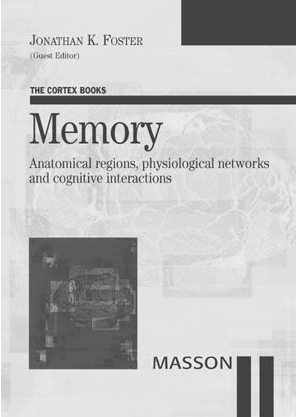PM
--> H P ITA
--> ARGOMENTI ED AREE
--> NOVITÁ
--> RECENSIONI
--> LIBRI
|
PSYCHOMEDIA
|
LIBRI - Recensioni e Presentazioni
|
Guest Editor: Jonathan K. Foster
Memory - Anatomical regions, physiological networks
And cognitive interactions
The Cortex Books
Masson, 2004
Euro 49,00
pubblicazione: aprile 2004
pagine: 616
illustrazioni: 70
rilegatura: cartonato
formato: 17 x 24 cm
ISBN 88214.2779.X
| |  |
- AUTORE
Guest Editor: Jonathan K. Foster, University of Western Australia and Neurosciences Unit, Health Department of Western Australia
- DESTINATARI
Neuropsicologi, Neurologi, Psicologi, Psichiatri.
- PUNTI DI FORZA
- Lo stato dell’arte sulla conoscenza delle basi neurali della memoria, presentato dai più autorevoli esperti internazionali.
- Riferimento a concetti centrali, quali inibizione, interferenza e memoria di lavoro, che in passato sono stati collegati a disparati processi cognitivi o regioni del cervello, creando confusione e incertezza nelle comunità di ricerca e clinica neuropsicologica.
- PRESENTAZIONE
La memoria è un processo psicologico fondamentale per molte attività cognitive e sociali (linguaggio, identificazione di persone e oggettiÉ). Le basi neurali della memoria sono da decenni un argomento di grande interesse per neuropsicologi e neurologi. Piuttosto che concentrarsi su una singola regione del cervello o un sistema neurochimico, i ricercatori contemporanei sono sempre più propensi a ritenere che la memoria complessa sia il risultato di sistemi interconnessi di reti neurali (temporali, diencefaliche, frontali), ognuna delle quali contribuisce in modo diverso alla consapevolezza soggettiva dei ricordi. In questa raccolta sono affrontati gli aspetti chiave riguardanti la neuropsicologia della memoria attraverso i lavori di esperti internazionali sull’argomento.
- CONTENUTO
Long-term amnesia: A review and detailed illustrative case study. A case of amnesia at an early age. Hemispheric asymmetries in memory processes as measured in a false recognition paradigm. Engagement of lateral and medial prefrontal areas in the ecphory of sad and happy autobiographical memories. Disruption of inhibitory control of memory following lesions to the frontal and temporal lobes. The neuropsychology of autobiographical memory. Two further investigations of autobiographical memory in semantic dementia. New learning and remote memory in atypical Alzheimer’s disease. The impact of disrupted cortico-cortico connectivity: A long term follow-up of a case of local retrograde amnesia. Encoding and the frontal lobes: A dissociation between retrograde and anterograde memories. A cholinergic explanation of dense amnesia. Remembering and knowing in patients with frontal lobe injuries. Role of the frontal lobes in implicit and explicit retrieval tasks. Frontal cortex as the central executive of working memory: Time to revise our view. Evidence for quantitative domain dominance for verbal and spatial working memory in frontal and parietal cortex. Segregation of the neural correlates of language and phonological short-term memory. Seeking the neural substrates of visual working memory storage. Dissociating aspects of temporal and frequency processing: A functional ERP study in humans. Event-induced theta responses as a window on the dynamics of memory. The role of theta-range oscillations in synchronising and integrating activity in distributed mnemonic networks. Regional brain activations predicting subsequent memory success: an event-related fMRI study of the influence of encoding tasks. FDG-PET findings in the Wernicke-Korsakoff syndrome. Contributions of thalamic nuclei to declarative memory functioning. Acquisition, recall and forgetting of verbal information in long-term memory by young, middle-aged and elderly individuals. High prevalence of white matter hyperintensities in normal aging: Relation to blood pressure and cognition. On the involvement of prefrontal networks in cognitive ageing. Memory in autism: Review and synthesis. Hebb, pandemonium and catastrophic hyperamnesia: The hippocampus as a suppressor of inappropriate associations.
MASSON SPA - Via Muzio Attendolo detto Sforza 7/9 - 20141 MILANO MI
TEL. 02.574952.1 - FAX 02.574952.371 - e-mail: libri.comm@masson.it - sito internet: www.masson.it
PM
--> H P ITA
--> ARGOMENTI ED AREE
--> NOVITÁ
--> RECENSIONI
--> LIBRI
|